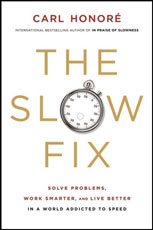"Every quick fix whispers the same seductive promise of maximum return for minimum effort. The trouble is the equation doesn't add up. Think about it for a moment: Is worshipping at the altar of the quick fix making us happier, healthier, and more productive? Is it helping to tackle the epic challenges that confront humanity in the twenty-first century? Is there really an app for everything? Of course not. Trying to solve problems in a hurry — sticking on a Band-Aid when surgery is needed — might deliver temporary reprieve, but usually at the price of storing up worse trouble for later. The hard, unpalatable truth is that the quick fix never truly fixes anything at all. And sometimes it just makes things worse.
"The evidence is all around us. Even as we drop billions of dollars on diet products promising Hollywood thighs and Men's Health abs in time for summer, waistlines are ballooning in much of the world. Why? Because there is no such thing as One Tip to a Flat Stomach. Academic studies show that most people who lose weight on diets regain it all, and often more, within five years. Even liposuction, the nuclear option in the slimming arms race, can backfire. Fat sucked from a woman's thighs and abdomen usually resurfaces within a year elsewhere on her body, as bingo wings, say, or shoulder flab.
"Sometimes the quick fix can be worse than no fix at all. Look at retail therapy. Buying the latest Louis Vuitton bag may lift your mood, but the effect is usually transient. Before long, you're back online or in the mall hunting for the next thrill — while unopened bills pile up like snowdrifts by the front door. . . .
"The bottom line here is clear: the quick fix is the wrong horse to back. On its own, no algorithm has ever solved a global health problem. No impulse buy has ever turned around a life. No drug has ever cured a chronic illness. No box of chocolates has ever mended a broken relationship. No educational DVD has ever transformed a child into a baby Einstein. No TEDTalk has ever changed the world. No drone strike has ever killed off a terrorist group. It's always more complicated than that.
"Everywhere you look — health, politics, education, relationships, business, diplomacy, finance, the environment — the problems we face are more complex and more pressing than ever before. Piss-poor performance is no longer an option. The time has come to resist the siren call of half-baked solutions and short-term palliatives and start fixing things properly. We need to find a new and better way to tackle every kind of problem. We need to learn the art of the Slow Fix."
